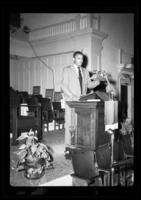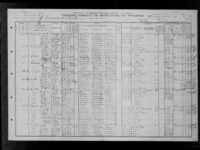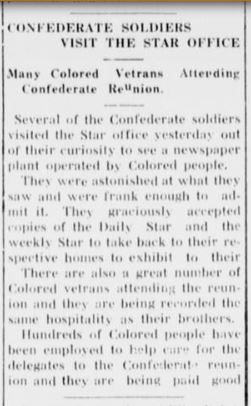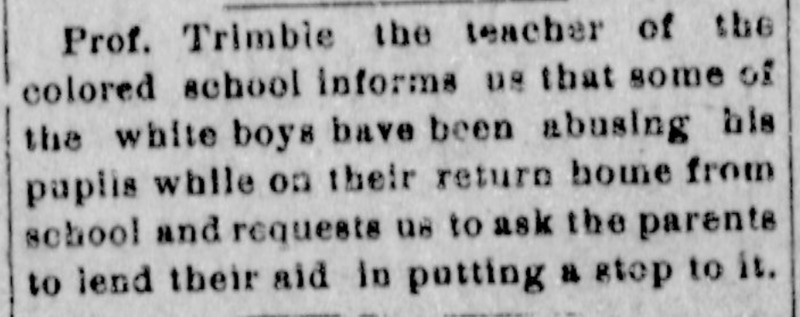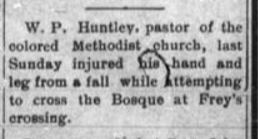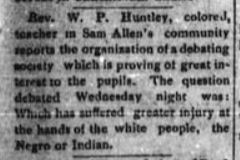A Preacher's Life
Preachers in the rural South were central figures in their community, especially in African American communities. They often held other occupations besides preaching, since preaching usually did not pay well. About half of southern preachers were forced to work other jobs to support themselves. According to Edward Ayers, fewer than a quarter of southern rural churches had a full-time minister. Furthermore, about a third of rural ministers served four or more churches. For instance, in Denton County Charles C. Trimble and William P. Huntley held other occupations and duties besides preaching. For many southerners, especially black southerners, church was central to the community during the late nineteenth and early twentieth centuries and remained central into the mid-twentieth century as they became a major force behind the Civil Rights Movement.
HUNTLEY, WILLIAM P. (1841-1922) William P. Huntley, an African American preacher, educator, mason and farmer was born to William and Elise Huntley, in Arkansas on March 10, 1843. Little is know about Huntley’s life in Arkansas before the Civil War; however there are reports from the Dallas Express mentioning that he visited family Arkansas towards the end of his life, which suggests that he had ties to Arkansas. Huntley relocated to Pilot Point, Texas around 1867 and became extremely involved in the African American community, in Denton County for the remainder of his life. He married a woman named, Marie around the turn of the century. According to the Dallas Express, Huntley had fifteen children in his lifetime. In 1883, Huntley, along with other prominent members of the African American communities in Denton County founded the Masonic Joppa Lodge #62, and attended their first regional meeting in Fort Worth, TX that year. According to The Galveston Daily News, Huntley attended the Texas Grand Lodge meeting of “Colored Masons” held in Galveston TX, in 1893. Furthermore, Huntley was appointed “grand senior seward” of the Texas Grand Masonic Lodge.
Aside from Huntley’s activities associated with the Masonic Lodge in Denton, he was also involved with church activities in Denton, County and North Texas. According to newspaper articles from the Dallas Express was a pastor at the Morning Chapel CME Church in Pilot. In 1883, he attended a CME conference held in McKinney, Texas, and was listed as a “traveling elders” and was on the publishing committee for Van Alstyne, Texas. Huntley traveled to other areas of Texas for church activities, including Stephenville. In 1904, Stephenville Tribune presumably reported on W.P. Huntley from Pilot Point getting injured on his travels to Stephenville, being “from the colored Methodist church.”
Although Huntley was an educator in Pilot Point, his teaching activities do not seem to reported as much as his preaching or masonic activities. However, in 1896, he attended a “state conference for colored citizens” in Dallas with Charles C. Trimble, also an African American educator and preacher from Pilot Point. In 1888, Huntley held a debate among African American pupils asking, “Which has suffered greater injury at the hands of the white people, the Negro or Indian?”
Even a few years before Huntley’s death, he continued to embark on journeys outside the North Texas region to visit his remaining family from Arkansas and at least made one trip to Oklahoma. In 1918, The Tulsa Star reported Huntley as an ex-confederate soldier attending a Confederate Reunion in the city, and there were other African Americans that attended the reunion.In 1919, As a mason and a pastor of the Morning Chapel Church, he helped install the cornerstone into the church and preached a cornerstone sermon following the installation.
On November 24, 1922, Huntley died of tuberculosis at his home in Pilot Point. Huntley was 81 year-old and was considered as, “a pioneer member of the CME Church” who served 50 years in the ministry. According to the Dallas Express, funeral services were conducted on Sunday, November 26, with Rev. W.L. Smith leading the services at Morning Chapel CME. Ms. Lucille Bruce, a former resident of Pilot Point during the early twentieth century mentions that it was common for African American church members to have their funerals held on Sunday at the church they attended. Pilot Point residents and masons from Denton were among the funeral attendees.
News coverage
"Texas Deaths, 1890-1976," database with images, FamilySearch (https://familysearch.org/ark:/61903/1:1:K3CX-XPC : 13 March 2018), W P Huntley, 24 Nov 1922; citing certificate number 31147, State Registrar Office, Austin; FHL microfilm 2,074,636.; The Dallas Express (Dallas, Tex.), Vol. 27, No. 34, Ed. 1 Saturday, May 29, 1920, newspaper, May 29, 1920; Dallas, Texas. (texashistory.unt.edu/ark:/67531/metapth278311/m1/7/?q=%22W.P.%20Huntley%22: accessed April 25, 2018), University of North Texas Libraries, The Portal to Texas History, texashistory.unt.edu; Masonic Lodge Proceedings Fort Worth, Texas, 1883 ;The Galveston Daily News. (Galveston, Tex.), Vol. 52, No. 94, Ed. 1 Sunday, June 25, 1893, newspaper, June 25, 1893; Galveston, Texas. (texashistory.unt.edu/ark:/67531/metapth467589/m1/13/?q=%22W.P.%20Huntley%22: accessed April 24, 2018), University of North Texas Libraries, The Portal to Texas History, texashistory.unt.edu; crediting Abilene Library Consortium;Minutes of the Northwest Texas Annual Conference of the CME Church in America Held at McKinney, Texas, Nov. 21,22,23,24,25 and 26, 1883. Dallas: Dallas Herald Steam Print, Main Street, 1883; The Stephenville Tribune. (Stephenville, Tex.), Vol. 13, No. 19, Ed. 1 Friday, May 12, 1905, newspaper, May 12, 1905; Stephenville, Texas. (texashistory.unt.edu/ark:/67531/metapth881493/m1/4/?q=%22W.P.%20Huntley%22: accessed April 24, 2018), University of North Texas Libraries, The Portal to Texas History, texashistory.unt.edu; crediting Stephenville Public Library; Denton County News. (Denton, Tex.), Vol. 6, No. 15, Ed. 1 Thursday, August 12, 1897, newspaper, August 12, 1897; Denton, Texas. (texashistory.unt.edu/ark:/67531/metapth504206/m1/4/?q=%22W.P.%20Huntley%22%20%20%20%20-Post-Mirror%201888: accessed April 24, 2018), University of North Texas Libraries, The Portal to Texas History, texashistory.unt.edu; crediting Abilene Library Consortium; Smitherman, Andrew Jackson. The Tulsa Star (Tulsa, Okla.), Vol. 6, No. 44, Ed. 1, Saturday, September 28, 1918, newspaper, September 28, 1918; Tulsa, Oklahoma. (gateway.okhistory.org/ark:/67531/metadc72767/m1/4/: accessed April 25, 2018), The Gateway to Oklahoma History, gateway.okhistory.org; crediting Oklahoma Historical Society; The Dallas Express (Dallas, Tex.), Vol. 27, No. 7, Ed. 1 Saturday, November 22, 1919, newspaper, November 22, 1919; Dallas, Texas. (texashistory.unt.edu/ark:/67531/metapth278287/m1/8/?q=%22W.P.%20Huntley%22: accessed April 25, 2018), University of North Texas Libraries, The Portal to Texas History, texashistory.unt.edu; The Dallas Express (Dallas, Tex.), Vol. 30, No. 6, Ed. 1 Saturday, December 2, 1922, newspaper, December 2, 1922; Dallas, Texas. (texashistory.unt.edu/ark:/67531/metapth278420/m1/3/?q=Huntley: accessed April 14, 2018), University of North Texas Libraries, The Portal to Texas History, texashistory.unt.edu;Bruce, Lucille. Interviewed by Sarah Cunningham. UNT Oral History Program, May 2, 2018, Denton, Texas; The Dallas Express (Dallas, Tex.), Vol. 27, No. 7, Ed. 1 Saturday, November 22, 1919, newspaper, November 22, 1919; Dallas, Texas. (texashistory.unt.edu/ark:/67531/metapth278287/m1/8/?q=%22W.P.%20Huntley%22: accessed April 25, 2018), University of North Texas Libraries, The Portal to Texas History, texashistory.unt.edu; Dallas Morning News (newspaper), Dallas Tex. “Colored Baptist Convention” Vol. XII, No.336, September 2, 1897. Dallas Public Library, Dallas, Texas; Dallas Morning News, Dallas Tex. Vol. XXII, No.64, December 2, 1906.
